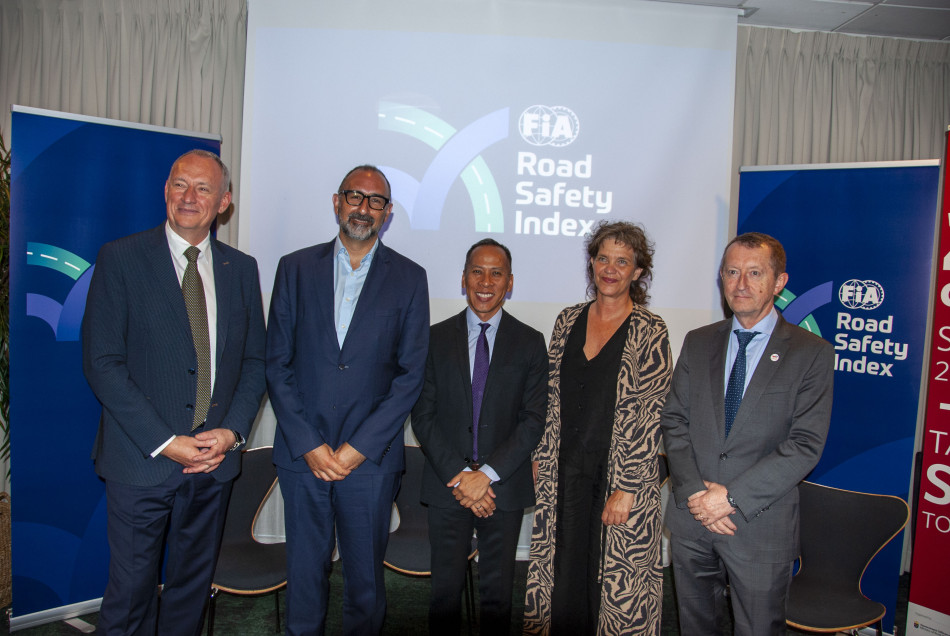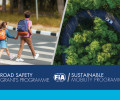FIA Calls on Organisations and Companies to Assess their Safety Footprint at the Vision Zero Conference
At the Vision Zero Conference in Stockholm, the FIA presented its FIA Road Safety Index, announced TotalEnergies as being the first private sector company to reach the highest level of achievement of the Index, and encouraged companies and organisations to join the efforts for safer roads.

At the Vision Zero Conference organised by the Government Offices of Sweden, the Swedish Transport Administration - Trafikverket and the Swedish Innovation Agency Vinnova, the FIA gathered road safety experts to highlight the key role organisations and private sector companies can play in improving safety of the roads.
FIA Secretary General for Automobile Mobility and Tourism Jacob Bangsgaard, TotalEnergies SVP HSE Michel Charton, FIA Foundation Executive Director Saul Billingsley, World Health Organization Head of Safety and Mobility Nhan Tran and Swedish Transport Administration Director of Traffic Safety Maria Krafft discussed about the FIA Road Safety Index, an innovative tool enabling companies and organisations to measure their safety footprint over their entire value chain.
The Index offers an effective solution for companies and organisations to commit to safer roads as it gives them a framework to assess their performance, report on it and improve their road safety impact by building a culture of safety.
The panel started with the announcement of TotalEnergies as being the first private sector company to receive 3-star recognition, the highest level of achievement as part of the FIA Road Safety Index.
FIA Secretary General for Automobile Mobility and Tourism Jacob Bangsgaard reminded the fact that the FIA Road Safety Index, based on different level of achievements, is conceived as a tool for progress. “It is not about shaming those who don't have the 3-star level yet, it is about encouraging them to reach that level and it is about inspiring any organisation to include traffic safety in their sustainability reporting,” he said.
He also highlighted how the FIA is planning to rely on its network of 243 Members in 147 countries to support the deployment of the Index. “We are representing Mobility Clubs from all over the world and we will work with our Members to spread the message on the importance of calculating the road safety footprint on a national level, help us do the assessments and involve the industries,” he underlined.
TotalEnergies SVP HSE Michel Charton explained why they decided to implement the Index and first insisted on the scale of the impact that TotalEnergies can have on making the roads safer. “Globally, (TotalEnergies travels) 600 million kilometers per year, in countries with different risk levels: western European countries, but also in Brazil, in India, and in almost all African countries,” he said.
“Our journey started when we said we want 0 fatality in our company,” he continued.
Charton also underlined what the Index is bringing to companies: “Benchmarking is a very important work because we cannot progress without it and this Index is a way to see where we are, a way to see what we have to improve, a way to see what can be the goals.”
“We were proud to participate and to be the first audited company and we are honoured to be ranked three stars. I hope it is the very beginning of something big that can that can help all the private sector to improve safety on the road,” he concluded.
The FIA Foundation supported the development of the Index and FIA Foundation Executive Director Saul Billingsley also emphasised the power of benchmarking and how the Index can become a key part of organisations and companies’ social responsibility reporting policy.
“The Index is an important tool to help companies that have not internalised road safety work to see what others are doing, step up, and make the changes we need. The FIA Foundation hopes that this will be the start of something which will end with investors and shareholders viewing companies’ road safety footprint as an essential part of ESG, at the core of social and planetary responsibility,” he said.
World Health Organization Head of Safety and Mobility Nhan Tran also insisted on the fact that, when developing the global plan for the Decade of Action 2021-2030, the influence of private sector entities in shaping safer mobility and transport systems was highlighted and that the Index offers a tailor-made solution to increase their involvement.
“The performance measure of the Index provides a tool that is public, that is transparent, that can be used by consumers, by the media to hold private sector entities accountable for their road safety footprint. This is a very unique mechanism that has been put in place by the FIA Index that helps us to work in parallel with government actions and with the private sector actions. For us, this is a really important milestone in terms of our engagement strategy with both public and private sector,” he said.
Swedish Transport Administration Director of Traffic Safety Maria Krafft, who had been involved in the development of the FIA Road Safety Index as part of the pilot phase, also insisted on the need to onboard the private sector and explained that it must be understood that mobility can only be sustainable if it is safe.
“I think that we need to be much better at including road safety in the sustainability world because that is where the private sector is and that is the language the private sector understands. We can be better at showing the problem and the level of road safety consequences. So I think that this benchmarking tool can help us to get out there,” she declared.

 Facebook
Facebook Twitter
Twitter






